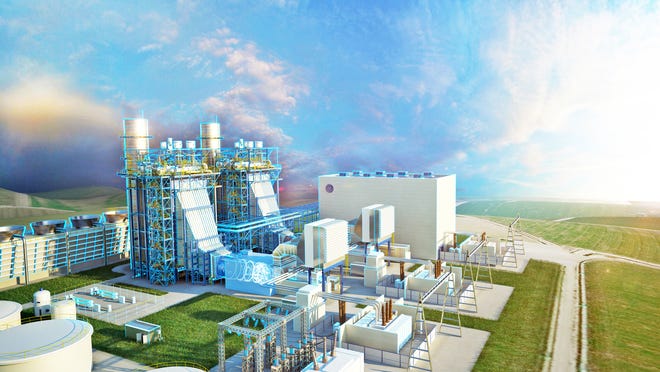DTE breaks ground on St. Clair Co. power plant
 Breana Noble
Breana Noble
East China Twp. — Rainy weather Tuesday morning prevented DTE Energy from officially breaking ground on its new natural-gas power plant in St. Clair County.
But the company said at an indoor ceremony that it is making preparations to begin constructing the electricity-generating plant in spring 2019.
“The wind doesn't always blow and the sun doesn't always shine in our beautiful state,” DTE CEO Gerry Anderson said. “Not a lot of renewable energy will be generated on our grid today, and that's why we need natural-gas fueled plants like the Blue Water Energy Center.”
The 30-acre, $1-billion Blue Water Energy Center would create 1,150 megawatts of electricity for the Detroit-based utility company. The facility, the first plant DTE has built since 1984, is expected to be Michigan's most fuel-efficient power plant. It would provide electricity to 850,000 homes — 15 percent of DTE's territory — starting in spring 2022. The project is expected to create more than 500 construction jobs and more than 35 permanent full-time positions.

"We are in the midst,” Anderson said, “of an extremely fundamental and important transformation of how we produce power here at DTE and in the state.”
Blue Water would be 70 percent cleaner and 40 percent more efficient than the three coal-fired power plants it would replace. Those three, including the Belle River Power Plant on the same site, power 1.2 million homes and represent 20 percent of the company's total electricity production.
Despite the Trump administration announcement Tuesday that it would scale back Obama-era regulations on coal-fired power plants, Anderson said DTE is committed to retiring its five remaining coal plants by 2040. Natural gas and renewable power have become less expensive than coal power. And the utility's coal plants are aging and would need updating; some of DTE's coal generators date to the early 1950s
"The maintenance costs and operation simply doesn't make sense for us to be investing substantial capital into them,” Anderson said. “We've made the decision that it's time to move on.”
DTE has committed to reducing its carbon emissions 30 percent by the early 2020s and more than 80 percent by 2050. Anderson said the company is not laying off any employees, but will move those who are not ready to retire to other plants such as Blue Water.
Mike Smith, president of Local 2233 for the United Electrical Workers of America, represents 3,800 employees who work for DTE.
“It's a good opportunity for continuing employment and stability for our workforce,” he said of Blue Water.
In April, the Michigan Public Service Commission, which regulates electricity rates, unanimously approved of the plant a mile away from its coal-fired St. Clair Power Plant. That approval came despite criticism from environmental groups that urged the utility to increase its use of renewable resources such as wind and solar. Several of those groups on Wednesday filed their opening briefs for an appeal of the commission's decision.
DTE has plans to invest $1.7 billion to double its renewable energy capacity by 2022 to 2,000 megawatts, which is enough to power 800,000 homes. Two new wind parks are scheduled to come into operation in the next year, producing 330 megawatts. A third is in the works, as well.
“This is the largest single step the company will have taken to reduce carbon emissions,” Anderson said of the coal plants retiring.
Solar energy is available in Michigan about 20 percent of the time and wind energy is available about 40 percent of the time, Anderson said. Blue Water would be able to produce energy for Michigan and the Midwest at any time.
“Reliability is the most important thing for your customers, my constituents, and for economic growth in the community,” said U.S. Rep. Paul Mitchell, R-Dryden. “That's a huge investment in that.”
Kiewit Engineering Co. is building Blue Water. It plans to spend a minimum of $200 million on Michigan labor and materials. GE Power is providing power-generation equipment.
DTE contributes annually $828 million in taxes to St. Clair County and has had generated power there for nearly 100 years, Commissioner Jeff Bohm said. DTE employs about 16,000 people.
“DTE was able to provide a lot of employment for a long time,” Bohm said. “It's fed a lot of families in our community.”
bnoble@detroitnews.com